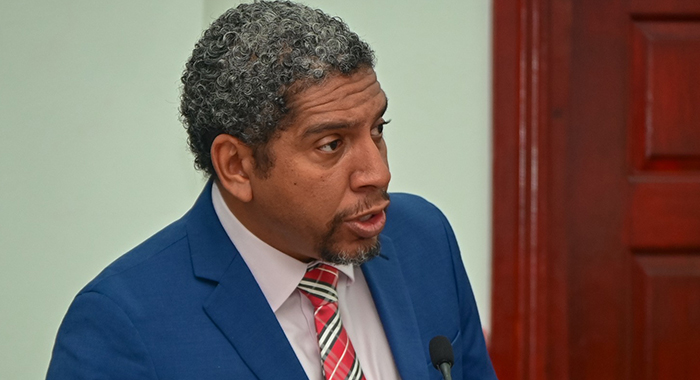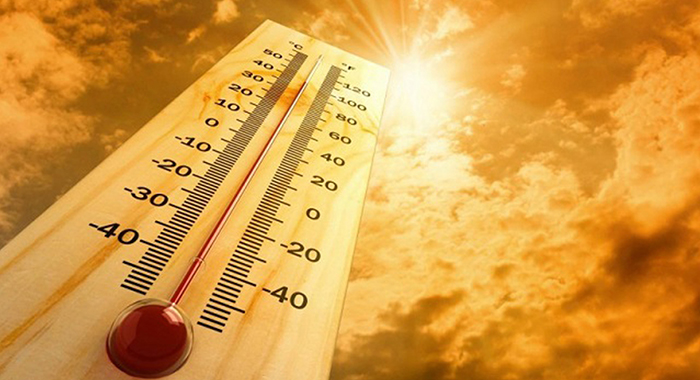Minister of Finance Camillo Gonsalves has slammed the “glacial” progress at the climate talks in Dubai last year, even as countries, such as St. Vincent and the Grenadines, suffer the consequences of climates change, including searing heat.
Presenting his EC$1.6 billion budget for 2024 to lawmakers, Gonsalves said that 2023 was the hottest year ever on planet Earth.
“The last six months of 2023 were the hottest six months globally in history. St. Vincent and the Grenadines was no exception. And we know that. Who feels it knows it.”
He said that in September, the country experienced a record of 25 consecutive days above average temperature.
“Taking into account the heat index, September 2023 felt like it was between 38 degrees and 48 degrees Celsius for those 25 days. In Fahrenheit that’s 100 degrees to 109 degrees Fahrenheit,” he said of the country where temperatures have traditionally varied between 25 degrees Celsius to 31 degrees Celsius, rarely rising above 32 degrees Celsius.
“Over the 92-day stretch from Aug. 1 to Oct. 31 in St Vincent and the Grenadines, 73 of those days were at an above average temperature. Further, according to our Met Office, 2023 was our sixth consecutive year of below average rainfall.
“The implications of heat and drought are obvious for farmers, for the Central Water and Sewerage Authority (CWSA), for vulnerable Vincentians and for our national development plans.”
He said the 2024 fiscal package includes production support for farmers, including irrigation and water harvesting equipment.
“Additionally, as part of the Regional Disaster Vulnerability Reduction Project (RDVRP), equipment and training were provided to CWSA staff to assist in grappling with these new climate realities. The ongoing Volcanic Eruption Emergency Project (VEEP) has awarded a contract to the CWSA to design and construct enhancements to the North Windward water supply,” he said.
“The realities of climate change and our inbuilt vulnerabilities assure us that we will experience more climate disasters in the future. We know they will happen. We just don’t know when,” the finance minister said.
He noted that last month’s 28th annual attempt to do something meaningful about climate change took place 31 years after the famous Earth Summit in Brazil.
Gonsalves pointed out that at the meeting in Brazil, global leaders first acknowledged that “human activities have been substantially increasing the atmospheric concentration of greenhouse gases and that additional warming of the Earth’s surface and atmosphere may adversely affect natural ecosystems and human kind”.

He further noted the pledge 31 years ago to stabilize greenhouse gas concentrations in the atmosphere at a level that would protect dangerous anthropogenic interference with the climate system.
“Thirty-one years later, the annual pageant of summitry is producing exponentially more handwringing and increasingly diminishing returns, as the political processes, pollution promises and pledges of assistance are increasingly out of touch with the devastating realities of climate change today. “
He said the progress achieved at the summits “is glacial, while glaciers melt.
“The amounts of money pledged to support affected countries rise far slower than the rising seas themselves.”
The finance minister told Parliament that the 28th iteration of the talks, known as COP 28, had two so-called “achievements”.
“First, to pledge US$700 million to a Loss and Damage Fund, which, previously, embarrassingly, had no funds at all. And second, to set the year 2050 – 58 years after the original Earth Summit – to achieve the undefined status of “net zero,” where emissions and reductions cancel each other out.”
Gonsalves said context is important and pointed out that the Loss and Damage Fund is for vulnerable countries around the world that are hit hard by climate disasters.
“It currently has a total of US$700 million to spend for this global support. But when Hurricane Maria hit Dominica in 2017, it caused US$1.4 billion in losses and damage — twice the amount of the endowment in the fund for the entire world.”
Addressing the local situation, he said a recent feasibility study on preparation for the Georgetown Sea Defense project on the north east coast of St. Vincent, indicated that over the last 40 years, seas have encroached by 180 feet along many sites on the windward course due to intensifying coastal erosion and sea level rise.
In Sandy Bay, another community on the northeast coast, the rate of erosion is eight to 10 feet every single year, the finance minister said.
“By 2050, this new ‘net zero’ deadline that we heard about in COP 28 and at the current rates of intensification, the seas will come ashore in some places by another 200 feet, at least.”
Gonsalves asked lawmakers and media audiences to set aside for a moment thoughts of hurricane damage and floods.
“Think about our Windward coast, and think about how many roads, homes, schools, churches, playing fields, guest houses and the like are already a stone’s throw from the encroaching seas, and think about if we have time to wait until 2050.
“We do not.”






